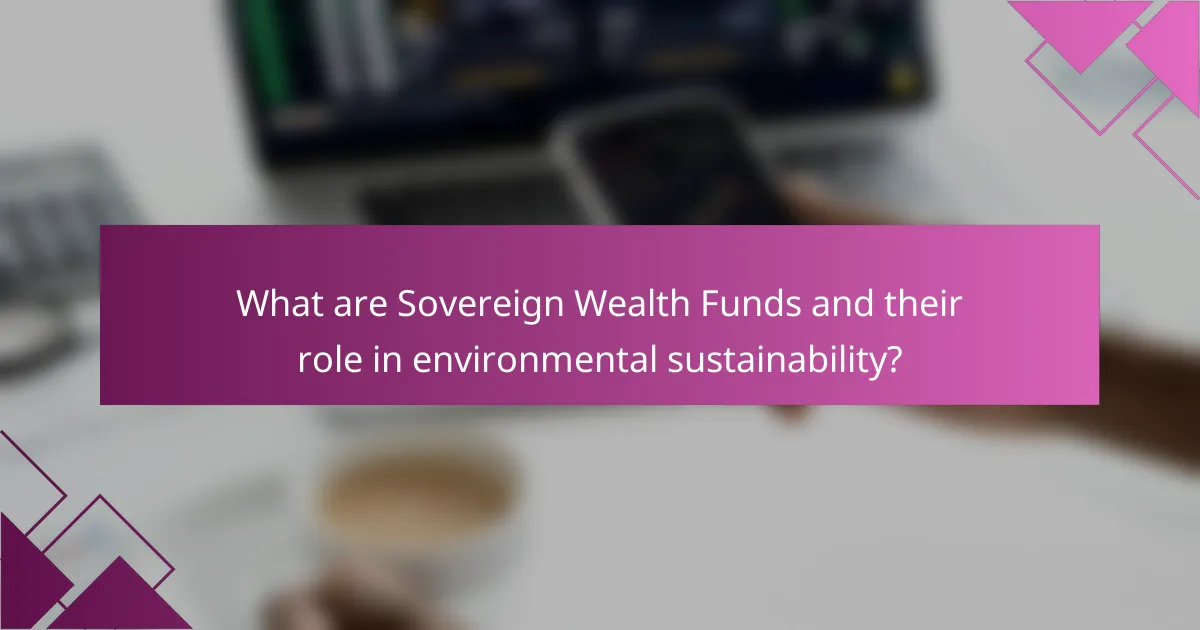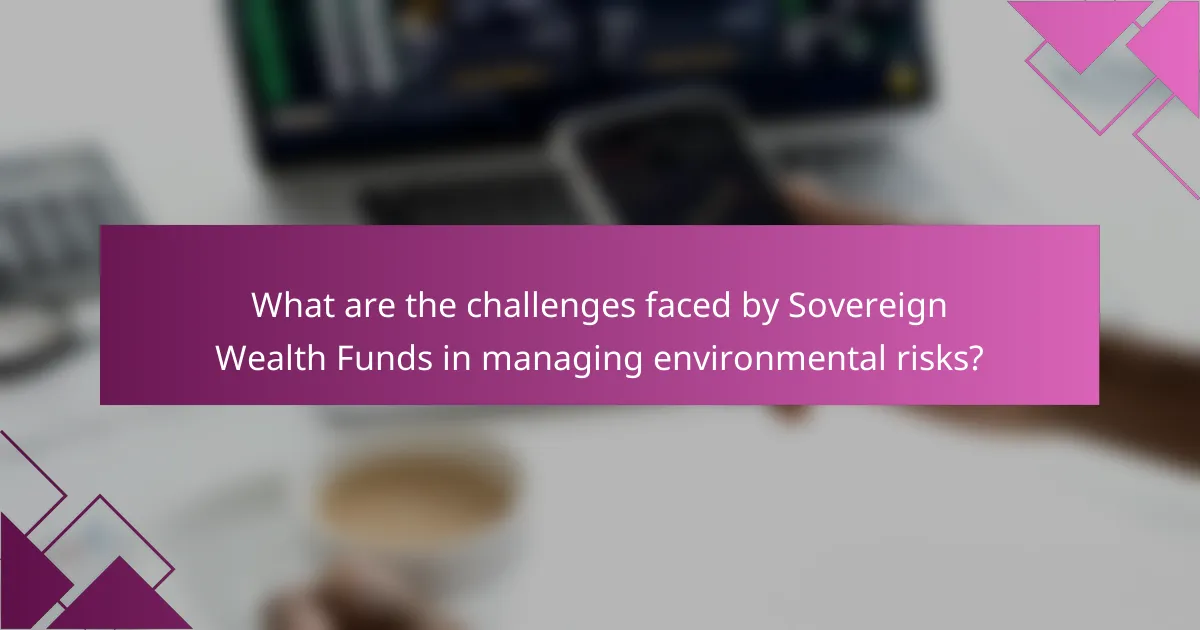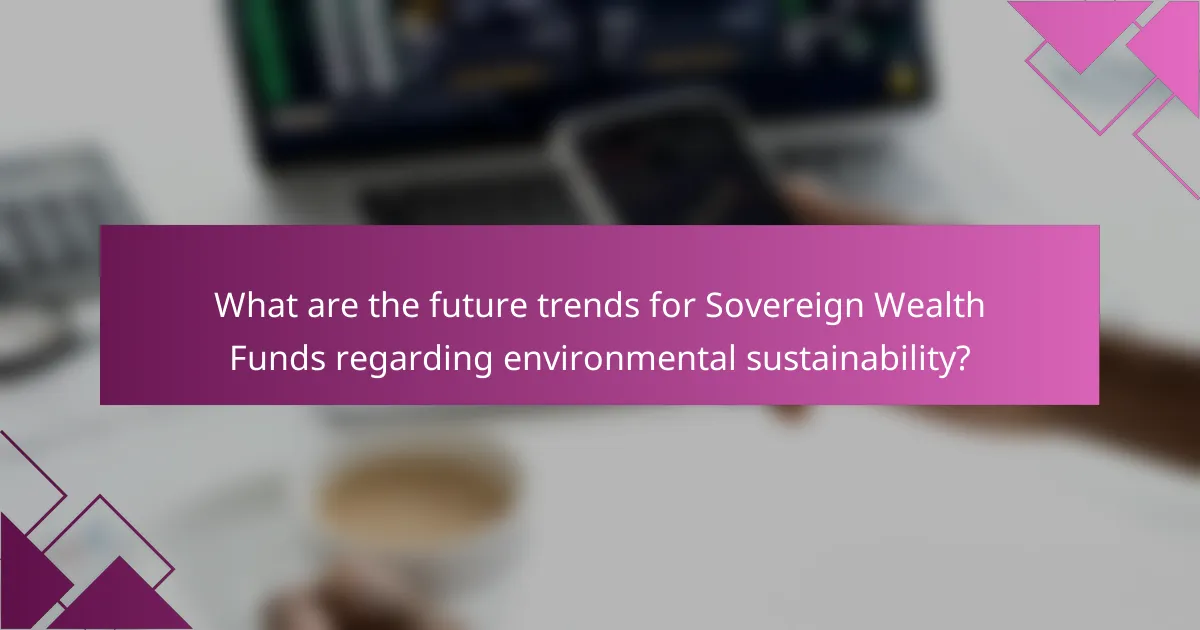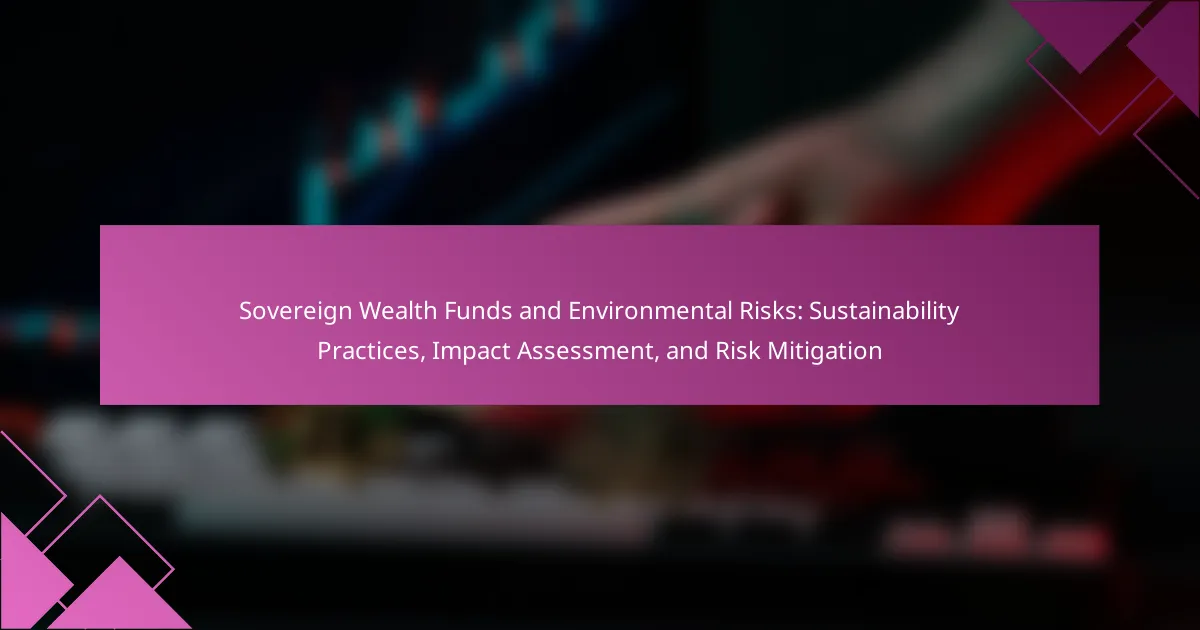
What are Sovereign Wealth Funds and their role in environmental sustainability?
Sovereign Wealth Funds (SWFs) are state-owned investment funds that manage national savings for the purpose of investment. They play a significant role in environmental sustainability by allocating capital towards sustainable projects and initiatives. Many SWFs are increasingly integrating environmental, social, and governance (ESG) criteria into their investment strategies. For example, the Government Pension Fund of Norway has a strong focus on responsible investments, divesting from companies that contribute to environmental degradation. Furthermore, SWFs can influence corporate behavior by engaging with companies on sustainability practices. Their financial power allows them to support renewable energy projects and green technologies, thereby promoting sustainable development. The total assets under management by SWFs reached approximately $10 trillion in 2021, showcasing their potential impact on global sustainability efforts.
How do Sovereign Wealth Funds impact environmental risks?
Sovereign Wealth Funds (SWFs) impact environmental risks by influencing corporate behavior through investment strategies. These funds often prioritize sustainable investments, thereby promoting environmentally responsible practices among the companies they invest in. For instance, SWFs like the Norwegian Government Pension Fund Global have strict ethical guidelines that exclude investments in companies that significantly harm the environment. Research indicates that when SWFs engage in shareholder activism, they can push for better environmental standards and practices within firms. Furthermore, SWFs increasingly allocate capital to renewable energy projects, reducing reliance on fossil fuels. This shift can lead to lower carbon emissions and mitigate climate change risks. Overall, the investment choices made by SWFs directly affect corporate environmental practices and broader sustainability efforts.
What are the primary environmental risks associated with investments from Sovereign Wealth Funds?
The primary environmental risks associated with investments from Sovereign Wealth Funds include climate change, biodiversity loss, and pollution. Climate change poses a risk through investments in fossil fuels, which contribute to greenhouse gas emissions. Sovereign Wealth Funds may also invest in industries that lead to deforestation, impacting biodiversity. Pollution from these industries can harm ecosystems and public health. According to the United Nations Environment Programme, investments in unsustainable practices can lead to significant financial losses. Furthermore, the Task Force on Climate-related Financial Disclosures highlights the financial implications of climate risks on investments. These factors underscore the importance of sustainable investment strategies for Sovereign Wealth Funds.
How do these funds assess the environmental impact of their investments?
Sovereign wealth funds assess the environmental impact of their investments through various methodologies. They utilize environmental, social, and governance (ESG) criteria as a framework. Funds often review companies’ sustainability reports and carbon footprints. They may also engage in third-party assessments to evaluate environmental risks. Quantitative metrics, such as greenhouse gas emissions, are analyzed for investments. Additionally, funds may apply scenario analysis to understand potential future impacts. Regular monitoring and reporting ensure ongoing compliance with environmental standards. These practices are supported by research indicating that integrating ESG factors can enhance long-term financial performance.
What sustainability practices are adopted by Sovereign Wealth Funds?
Sovereign Wealth Funds (SWFs) adopt various sustainability practices to align their investments with environmental, social, and governance (ESG) principles. These funds often integrate ESG criteria into their investment decision-making processes. They engage in shareholder activism to promote sustainable practices among portfolio companies. Many SWFs commit to divesting from fossil fuels and investing in renewable energy projects. They also participate in global initiatives like the Principles for Responsible Investment (PRI). Transparency in reporting their sustainability efforts is another common practice. For instance, the Norwegian Government Pension Fund Global publishes an annual report detailing its sustainability activities. These practices reflect a growing recognition of the importance of sustainability in long-term investment strategies.
Which frameworks guide the sustainability practices of Sovereign Wealth Funds?
Sovereign Wealth Funds (SWFs) are guided by several key frameworks for sustainability practices. These frameworks include the United Nations Principles for Responsible Investment (UN PRI) and the International Finance Corporation (IFC) Performance Standards. The UN PRI encourages funds to incorporate environmental, social, and governance (ESG) factors into investment decisions. The IFC Performance Standards provide a framework for managing environmental and social risks in projects. Many SWFs also align with the Sustainable Development Goals (SDGs) to promote global sustainability. These frameworks help SWFs assess and mitigate environmental risks effectively. Evidence shows that adherence to these frameworks enhances long-term financial performance and sustainability outcomes for SWFs.
How do Sovereign Wealth Funds integrate sustainability into their investment strategies?
Sovereign Wealth Funds integrate sustainability into their investment strategies by adopting Environmental, Social, and Governance (ESG) criteria. They assess potential investments based on their environmental impact and social responsibility. Many funds have established specific sustainability mandates or goals. For instance, they may commit to investing in renewable energy projects. Additionally, they engage with companies to improve their sustainability practices. Reports indicate that over 70% of Sovereign Wealth Funds consider ESG factors in their investment decisions. This shift reflects a growing recognition of sustainability’s impact on long-term financial performance.
Why is impact assessment crucial for Sovereign Wealth Funds?
Impact assessment is crucial for Sovereign Wealth Funds (SWFs) because it evaluates the potential social, environmental, and economic impacts of their investments. This process helps SWFs align their strategies with sustainable development goals. Effective impact assessments can identify risks and opportunities associated with investments. They enable SWFs to make informed decisions that enhance long-term returns. Additionally, impact assessments foster transparency and accountability in investment practices. A study by the International Forum of Sovereign Wealth Funds highlights that SWFs increasingly prioritize responsible investment. This trend reflects a growing recognition of the importance of sustainability in financial performance.
What methodologies are used for impact assessment in Sovereign Wealth Funds?
Sovereign Wealth Funds (SWFs) utilize various methodologies for impact assessment. Common methodologies include Social Return on Investment (SROI), Environmental Impact Assessment (EIA), and Integrated Reporting. SROI quantifies social, environmental, and economic value generated by investments. EIA evaluates potential environmental impacts of projects funded by SWFs. Integrated Reporting combines financial and non-financial information to assess overall performance. These methodologies help SWFs align investments with sustainability goals. They also facilitate transparency and accountability in reporting. For example, the UN Principles for Responsible Investment provides frameworks that guide these assessments.
How do Sovereign Wealth Funds measure the effectiveness of their sustainability initiatives?
Sovereign Wealth Funds measure the effectiveness of their sustainability initiatives through various metrics and frameworks. They often utilize Environmental, Social, and Governance (ESG) criteria to assess performance. Many funds adopt specific benchmarks to track progress against sustainability goals. Regular reporting and disclosure of sustainability impacts are common practices among these funds. Additionally, they may engage third-party assessments for independent evaluations. Some funds also conduct stakeholder consultations to gather feedback on their initiatives. Quantitative data, such as carbon footprint reductions, is frequently analyzed to gauge effectiveness. Qualitative assessments, including case studies, provide insights into best practices. These combined approaches ensure a comprehensive evaluation of sustainability efforts.

What are the challenges faced by Sovereign Wealth Funds in managing environmental risks?
Sovereign Wealth Funds face multiple challenges in managing environmental risks. One major challenge is the lack of standardized metrics for assessing environmental impact. This inconsistency makes it difficult to compare investments across different sectors. Another challenge is the varying regulatory frameworks in different countries. These regulations can affect investment decisions and risk assessments. Additionally, Sovereign Wealth Funds often invest in diverse asset classes. This diversity complicates the integration of environmental risk management practices. Furthermore, the long-term nature of their investments can lead to underestimating immediate environmental risks. Market volatility can also impact the financial viability of sustainable investments. Lastly, stakeholder pressure for transparency and accountability adds to the complexity of managing these risks.
How do geopolitical factors influence Sovereign Wealth Funds’ environmental strategies?
Geopolitical factors significantly influence Sovereign Wealth Funds’ environmental strategies. These funds often align their investment decisions with the political climate and regulatory frameworks of their home countries. For instance, funds from countries with strong environmental regulations tend to prioritize sustainable investments. Conversely, those from regions with lax environmental standards may exhibit less commitment to sustainability.
Additionally, geopolitical tensions can impact the availability of resources and investment opportunities. This can lead funds to reassess their portfolios to mitigate risks associated with resource scarcity. Historical events, such as sanctions or trade disputes, have also prompted funds to adapt their strategies to maintain stability.
For example, the Norway Government Pension Fund Global incorporates ethical guidelines reflecting its geopolitical context, emphasizing responsible investment. These dynamics illustrate how Sovereign Wealth Funds navigate the complexities of international relations while pursuing environmental objectives.
What role does public perception play in the investment decisions of Sovereign Wealth Funds?
Public perception significantly influences the investment decisions of Sovereign Wealth Funds (SWFs). SWFs are increasingly aware of their reputation and the potential backlash from stakeholders. Negative public perception can lead to pressure from citizens, activists, and governments. This pressure often prompts SWFs to reconsider investments in sectors deemed harmful, such as fossil fuels. For instance, in recent years, several SWFs have divested from coal and oil companies due to public outcry over climate change. A study by the International Institute for Sustainable Development found that SWFs are more likely to adopt sustainable investment practices when faced with negative public sentiment. This demonstrates that public perception not only shapes investment strategies but also aligns them with broader environmental and social goals.
How do regulatory changes affect the sustainability practices of Sovereign Wealth Funds?
Regulatory changes significantly influence the sustainability practices of Sovereign Wealth Funds (SWFs). These funds must adapt to new laws and guidelines that promote environmental, social, and governance (ESG) criteria. For instance, regulations may require SWFs to disclose their sustainability strategies and investment impacts. Such transparency can lead to increased scrutiny from stakeholders and the public. In response, SWFs often enhance their ESG integration to align with regulatory expectations. Additionally, regulatory incentives can encourage SWFs to invest in sustainable projects. For example, tax benefits may be offered for green investments. Compliance with evolving regulations also drives SWFs to adopt best practices in sustainability, ensuring they remain competitive and responsible investors.
What strategies are employed for risk mitigation in Sovereign Wealth Funds?
Sovereign Wealth Funds employ several strategies for risk mitigation. Diversification is a primary strategy, spreading investments across various asset classes and geographies. This reduces exposure to any single economic downturn. Additionally, they utilize hedging techniques to protect against market volatility. This can involve derivatives or other financial instruments.
Sovereign Wealth Funds also conduct thorough due diligence before making investments. This process identifies potential risks associated with specific assets or markets. Regular risk assessments help in monitoring and adjusting portfolios as needed. Furthermore, they often engage in active management to respond to changing market conditions.
Finally, many funds incorporate environmental, social, and governance (ESG) criteria into their investment decisions. This approach aims to mitigate risks related to sustainability and ethical concerns. By focusing on long-term value, they seek to protect their capital from future risks.
What risk management frameworks are commonly used by Sovereign Wealth Funds?
Sovereign Wealth Funds commonly use several risk management frameworks. The most prevalent frameworks include the Enterprise Risk Management (ERM) framework, which provides a holistic approach to identifying and managing risks. Another widely used framework is the International Organization for Standardization (ISO) 31000, which offers guidelines for risk management processes. Additionally, the Committee of Sponsoring Organizations of the Treadway Commission (COSO) framework is utilized for integrating risk management with organizational governance. These frameworks help Sovereign Wealth Funds assess environmental risks and implement effective mitigation strategies. The adoption of these frameworks is supported by their proven effectiveness in enhancing risk awareness and decision-making processes.
How do Sovereign Wealth Funds collaborate with other entities to mitigate environmental risks?
Sovereign Wealth Funds (SWFs) collaborate with other entities to mitigate environmental risks through strategic partnerships and investments. They engage with governments, NGOs, and private sector organizations to promote sustainable practices. SWFs often invest in renewable energy projects, which reduces reliance on fossil fuels. They also participate in global initiatives aimed at climate change mitigation, such as the Paris Agreement. By pooling resources with other investors, SWFs can finance large-scale environmental projects. Additionally, SWFs adopt Environmental, Social, and Governance (ESG) criteria in their investment strategies. This approach encourages companies to prioritize sustainability. Collaborative efforts enhance the effectiveness of risk mitigation strategies. SWFs play a crucial role in promoting environmental sustainability on a global scale.

What are the future trends for Sovereign Wealth Funds regarding environmental sustainability?
Sovereign Wealth Funds (SWFs) are increasingly prioritizing environmental sustainability in their investment strategies. Future trends indicate a shift towards integrating environmental, social, and governance (ESG) criteria into decision-making processes. Many SWFs are committing to net-zero emissions targets by 2050. This commitment aligns with global climate agreements and reflects growing investor demand for sustainable practices.
Additionally, SWFs are increasing their investments in renewable energy and green technologies. Reports show that investments in sustainable assets are expected to grow significantly in the coming years. SWFs are also engaging in active stewardship, influencing companies to adopt more sustainable practices.
This trend is supported by the United Nations Principles for Responsible Investment, which many SWFs have endorsed. The growing emphasis on transparency and accountability in sustainability reporting is also shaping future trends. As a result, SWFs are likely to play a crucial role in financing the transition to a low-carbon economy.
How are technological advancements shaping the sustainability practices of Sovereign Wealth Funds?
Technological advancements are significantly shaping the sustainability practices of Sovereign Wealth Funds (SWFs). These funds increasingly utilize data analytics to assess environmental risks associated with their investments. Advanced algorithms analyze large datasets to identify sustainable investment opportunities. Artificial intelligence aids in monitoring the social and environmental impact of portfolio companies. Blockchain technology enhances transparency in transactions and sustainability reporting. Machine learning models predict long-term sustainability trends, guiding investment strategies. According to the Global Sustainable Investment Alliance, SWFs have increased their sustainable assets under management by over 30% in recent years. This trend showcases how technology facilitates informed decision-making in sustainability practices.
What innovations are emerging in the impact assessment processes of Sovereign Wealth Funds?
Innovations in the impact assessment processes of Sovereign Wealth Funds (SWFs) include enhanced data analytics and stakeholder engagement strategies. Advanced data analytics allow for more accurate measurement of social and environmental impacts. This technology utilizes big data and machine learning to analyze investment outcomes. Furthermore, SWFs are increasingly incorporating Environmental, Social, and Governance (ESG) factors into their assessments. This shift aligns with global sustainability trends and investor expectations. Collaborative frameworks with local communities are also emerging. These frameworks improve transparency and accountability in investment decisions. Recent studies show that these innovations lead to better long-term investment performance. They also mitigate risks associated with environmental and social issues.
What best practices can Sovereign Wealth Funds adopt for enhanced sustainability?
Sovereign Wealth Funds can adopt several best practices for enhanced sustainability. They should integrate Environmental, Social, and Governance (ESG) criteria into their investment strategies. This approach helps identify sustainable investment opportunities. Additionally, they can engage with companies to promote sustainable practices. Active ownership and voting on shareholder resolutions can drive change. Furthermore, they should report transparently on sustainability metrics. Regular assessments of portfolio impact on the environment are crucial. Collaboration with other funds can amplify sustainability efforts. Lastly, they can invest in renewable energy and sustainable infrastructure projects. These practices collectively enhance the sustainability profile of Sovereign Wealth Funds.
How can Sovereign Wealth Funds engage stakeholders in their sustainability efforts?
Sovereign Wealth Funds can engage stakeholders in their sustainability efforts through transparent communication and collaborative initiatives. By providing regular updates on sustainability goals, funds can foster trust among stakeholders. Engaging stakeholders in decision-making processes enhances accountability. Hosting forums and workshops allows for direct dialogue with stakeholders. Additionally, partnerships with environmental organizations can amplify sustainability efforts. Research shows that funds actively involving stakeholders see improved outcomes in sustainability initiatives. For example, the Norwegian Sovereign Wealth Fund has successfully integrated stakeholder feedback into its investment strategies.
What lessons can be learned from successful Sovereign Wealth Funds in managing environmental risks?
Successful Sovereign Wealth Funds (SWFs) demonstrate effective strategies for managing environmental risks. They prioritize sustainable investment practices. This includes integrating environmental, social, and governance (ESG) criteria into their decision-making processes. Many SWFs actively engage in climate risk assessments. They evaluate potential impacts on their investment portfolios from environmental changes. Additionally, successful SWFs often collaborate with stakeholders to promote sustainability. They support initiatives that enhance environmental resilience. For example, Norway’s Government Pension Fund Global focuses on divesting from fossil fuels. This approach reflects a commitment to reducing carbon footprint. Furthermore, transparency in reporting environmental impacts is crucial. SWFs that disclose their sustainability efforts build trust with stakeholders. These lessons highlight the importance of proactive risk management in investment strategies.
Sovereign Wealth Funds (SWFs) are state-owned investment vehicles that manage national savings, increasingly focusing on environmental sustainability. This article examines the role of SWFs in promoting sustainable practices, their impact on environmental risks, and the methodologies employed for effective impact assessment. It discusses the challenges faced by SWFs in managing environmental risks, the influence of geopolitical factors, and the importance of public perception and regulatory changes. Additionally, the article highlights future trends, technological advancements, and best practices that SWFs can adopt to enhance their sustainability efforts and engage stakeholders effectively.
